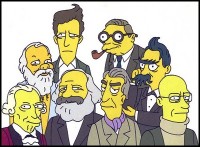PACTISS recommends

Where science meets art. The only necessary and sufficient book store in Melbourne.
Hope our friends enjoy the new look and feel – now optimised for mobile devices for access on the go.

PEOPLE
-
Coordinator: Peter Ellerton
Web guy: Jason Etheridge RESOURCE COLLECTIONS
NEW RESOURCES
-
- A nice Philosophy of Mind summary
- The power of categorical logic
- What exactly is the scientific method and why do so many people get it wrong?
- Paralympic athletes faster than olympic athletes — what does this tell us about difference?
- Logic: if + then = why? How can we understand the power of logic?
- How do we ensure we are exposed to new ideas? A parody with bite.
- A Life of Meaning (Reason Not Required) – What is the nature of our relationship with reason?
- Can you name this cognitive bias?
- By what measures can we value human life?
- Teaching philosophy improves standardised scores
- Are we in control of our own decisions?
- Neuroscience and education: myths and messages
- Free will is not as free as we think – and that’s ok.
- Where’s the Proof in Pseudoscience?
- Science in the lead?
RANDOM POSTS
-
- Vegetarians and IQ (Post hoc ergo propter hoc?)
- Yes Prime Minister - Survey Design
- Pope and Darwin
- Australia is just like Switzerland
- Truth Puzzles booklet
- If it's not right to rape a rapist, how can it be OK to kill a killer?
- It's all About Perception
- Animal Actors - Animal Rights, Human Perceptions
- Relativism
- David Papineau on Scientific Realism
USEFUL RSS FEEDS
 Philosopher’s Zone
Philosopher’s Zone NYTimes – The Stone
NYTimes – The Stone Philosophy Now
Philosophy Now RSA Animate
RSA Animate- The Green Corridors Initiative
- Governance governing government
- Why print money when we can print wealth?
- Building a resilient health and care system
- We'll always have Paris?
- Experimentation and equity in global cities
- Technology-enabled deliberative democracy
- Healthier placemaking
- Creating a sovereign wealth fund in Wolverhampton
- Economic recovery and climate action
 Scientific American – Mind and Brain
Scientific American – Mind and Brain- Kindness Can Have Unexpectedly Positive Consequences
- It's the Bass That Makes Us Boogie
- Subliminal Cues, Precisely Timed, Might Help People Forget Bad Experiences
- Severe COVID May Cause Brain Changes Similar to Aging
- Autism Treatment Shifts Away from 'Fixing' the Condition
- Fatherhood Changes Men's Brain, according to Before-and-After MRI Scans
- Many People with Bipolar Disorder Use Cannabis. It May Sometimes Help
- Why Social Media Makes People Unhappy--And Simple Ways to Fix It
- People Shopping for 'Meaning' Buy Cheaper Goods
- Pregnancy Changes the Brain, Possibly Promoting Bonding with a Baby
 TED talks
TED talks- Can the metaverse bring us closer to wildlife? | Gautam Shah
- The billion-dollar pollution solution humanity needs right now | Stacy Kauk
- Are video calls the best we can do in the age of the metaverse? | Josephine Eyre
- How great leaders take on uncertainty | Anjali Sud and Stephanie Mehta
- How Indigenous guardians protect the planet and humanity | Valérie Courtois
- How to tap into your awareness -- and why meditation is easier than you think | Yongey Mingyur Rinpoche
- Demystifying the wild world of crypto | Laura Shin
- How can we escape soaring energy bills? Stop using fossil fuels | Tessa Khan
- A disability-inclusive future of work | Ryan Gersava
- How to tackle the stigma of living with HIV | Gareth Thomas
THEMED RESOURCES
- December 2022MonTueWedThuFriSatSun282930123456789101112131415161718192021222324252627282930311
Category Archives: Philosophy of Science
What exactly is the scientific method and why do so many people get it wrong?
There’s a big difference between science and pseudoscience. But if people don’t understand how science works in the first place, it’s very easy for them to fall for the pseudoscience. Source: What exactly is the scientific method and why do … Continue reading
Posted in Critical Thinking, Media Articles, Cartoons, Philosophy of Science
Comments Off on What exactly is the scientific method and why do so many people get it wrong?
A Life of Meaning (Reason Not Required) – What is the nature of our relationship with reason?
If philosophy is to stay relevant, it must bridge the gap between feeling, thought and reason. Few would disagree with two age-old truisms: We should strive to shape our lives with reason, and a central prerequisite for the good life … Continue reading
Posted in Critical Thinking, Media Articles, Cartoons, Philosophy of Mind - Consciousness, Philosophy of Religion, Philosophy of Science
Comments Off on A Life of Meaning (Reason Not Required) – What is the nature of our relationship with reason?
Where’s the Proof in Pseudoscience?
Peter Ellerton, The Conversation Contrast this with homeopathy, a field that has generated no discernible growth in knowledge or practice. While the use of modern scientific language may make it sound more impressive, there is no corresponding increase in knowledge … Continue reading
Posted in Critical Thinking, Media Articles, Cartoons, Philosophy of Science
Comments Off on Where’s the Proof in Pseudoscience?
Teaching the nature of science (and keeping students engaged)
Peter Ellerton, The Conversation What’s particularly disturbing about current science education at the primary, secondary and tertiary level is the almost complete lack of explicit consideration of what I’ve referred to as the “nature of science”. Not only are many … Continue reading
Posted in Critical Thinking, Media Articles, Cartoons, Philosophy of Science
Comments Off on Teaching the nature of science (and keeping students engaged)
Why You Don’t Know Your Own Mind
Alex Rosenburg, The Stone. It is often said that we can never truly know the minds of others, because we can’t “get inside their heads.” Our ability to know our own minds, though, is rarely called into question. It is … Continue reading
Posted in Critical Thinking, Media Articles, Cartoons, Philosophy of Mind - Consciousness, Philosophy of Science
Comments Off on Why You Don’t Know Your Own Mind
The value of subjective experience (or not)
From smbc
Posted in Media Articles, Cartoons, Philosophy of Mind - Consciousness, Philosophy of Science
Comments Off on The value of subjective experience (or not)
Why would anyone believe the Earth is flat?
Peter Ellerton, The University of Queensland Belief in a flat Earth seems a bit like the attempt to eradicate polio – just when you think it’s gone, a pocket of resistance appears. … Continue reading
Posted in Critical Thinking, Media Articles, Cartoons, Philosophy of Science
Comments Off on Why would anyone believe the Earth is flat?
Dilbert on Zeno
Zeno does it again.
Posted in Media Articles, Cartoons, Philosophy of Science
Comments Off on Dilbert on Zeno
We can’t trust common sense but we can trust science
Peter Ellerton, The University of Queensland When a group of Australians was asked why they believed climate change was not happening, about one in three (36.5%) said it was “common sense”, according to a report published last year by the … Continue reading
Posted in Critical Thinking, Media Articles, Cartoons, Philosophy of Science
Comments Off on We can’t trust common sense but we can trust science
The Principle of Sufficient Reason
Form the Stanford Encyclopaedia of Philosophy “The Principle of Sufficient Reason is a powerful and controversial philosophical principle stipulating that everything must have a reason or cause. This simple demand for thoroughgoing intelligibility yields some of the boldest and most … Continue reading
Posted in Philosophy of Religion, Philosophy of Science, Web links
Comments Off on The Principle of Sufficient Reason
Hume’s criticism of the design argument
Hume-Dialogues – Jeff Speaks
Posted in Critical Thinking, Philosophy of Religion, Philosophy of Science
Comments Off on Hume’s criticism of the design argument
What use Philosophy?
Discuss.
Posted in Media Articles, Cartoons, Philosophy of Science, PowerPoints, Video and other Media
Comments Off on What use Philosophy?
A Useful Introduction to Critical Thinking Skills
Posted in Critical Thinking, Philosophy of Science, PowerPoints, Video and other Media
Comments Off on A Useful Introduction to Critical Thinking Skills
The Language of Science
Listen and learn: the language of science and scepticism Peter Ellerton Making sure what’s intended is what’s heard can be more difficult than it seems. Melvin Gaal (mindsharing.eu) As scientists, one of our responsibilities should be to promote clarity. A lot … Continue reading
Posted in Booklets, Handouts and Worksheets, Critical Thinking, Media Articles, Cartoons, Philosophy of Science
Comments Off on The Language of Science
Another Double Blind Test surprise
Stradivarius Fails Sound Test Versus Newbie Violins Download pdf (from sciam) Can you tell the difference between modern violins and antiques crafted by Italian masters? Don’t feel too bad – expert players can’t do it either. In a double-blind test, 21 experienced … Continue reading
Posted in Booklets, Handouts and Worksheets, Critical Thinking, Media Articles, Cartoons, Philosophy of Science
Comments Off on Another Double Blind Test surprise
Logic, Knowledge Systems and World Views
The way of logic – 02 December 1995 – New Scientist FOR almost two centuries, anthropologists have been studying how non-European cultures understand the world around them. Now philosophers of science are getting in on the act. Armed with intellectual … Continue reading
Posted in Media Articles, Cartoons, Philosophy of Language, Philosophy of Science
Comments Off on Logic, Knowledge Systems and World Views
The Changing Climate of Skepticism
Via Embiggen Books In this excellent talk given by Peter Ellerton (winner of the 2008 Australian Skeptics prize for Critical Thinking) on the Climate Change debate, the viewer is encouraged to examine the way in which the debate is being … Continue reading
Imagining the Tenth Dimension
Excellent intellectual exercise
A Wonderful Piece of Pseudoscience in Advertising
Well worth reading the whole lot. The language is absolute nonsense. “By strengthening the body’s own natural energy and innate intelligence, the QLink allows it to recognise and differentiate between which external energies are healthy, and which are not. The … Continue reading
How Science Works in Action
Faster-than-light neutrinos show science in action Making a very good point about when to believe evidence. via Scientific American Unless you’ve been hiding under a rock for the past 24 hours, you’ve probably heard about the neutrinos that … Continue reading
